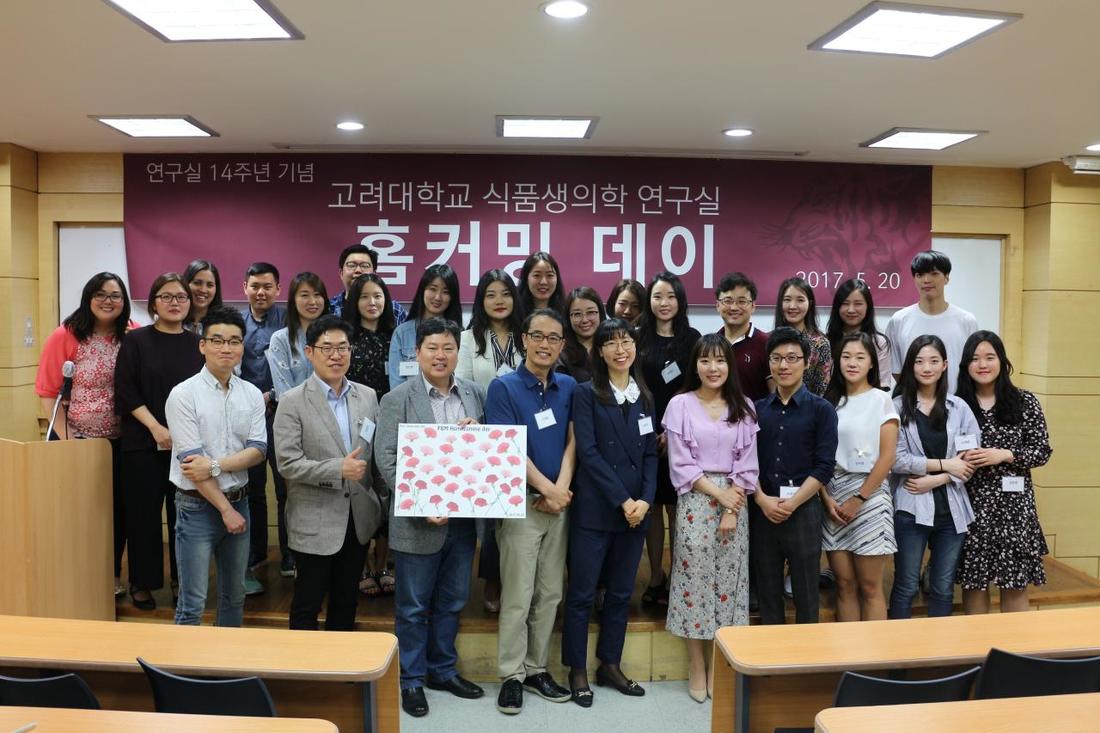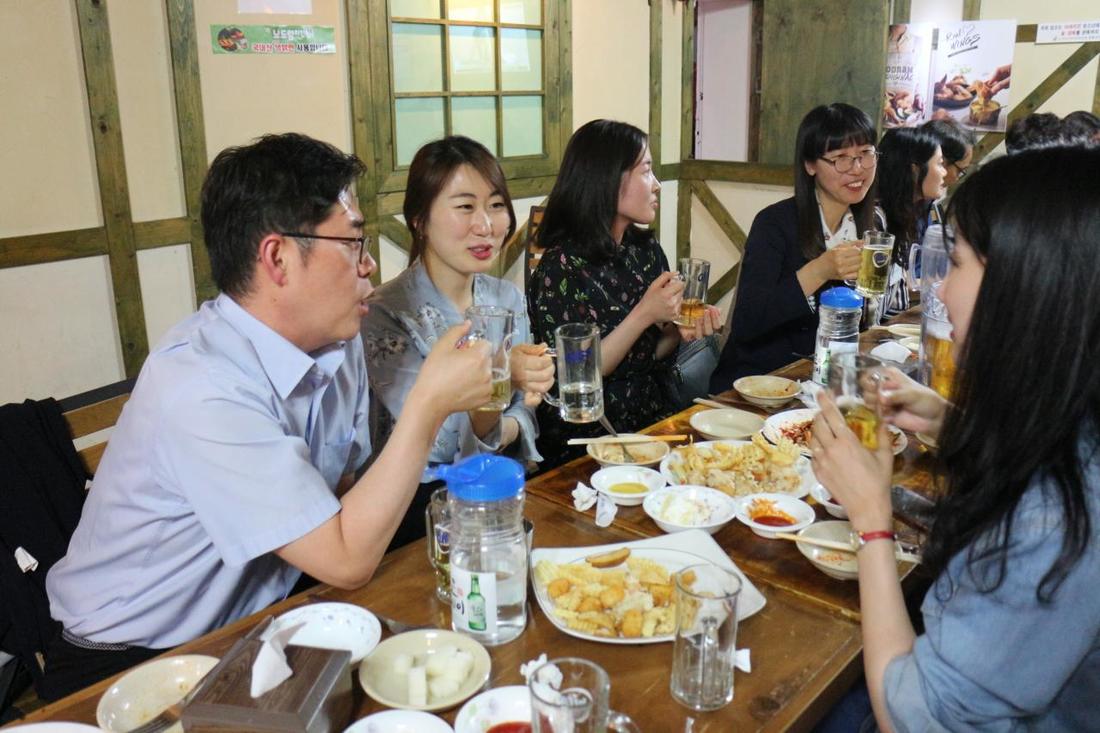Alumni Job Status (2017.07)
Ji-Hye Lee, PhD : 2017.1 Rural Development Administration Functional Agriculture Development, Post-Doc Researcher
Hyo-Min Park, PhD : 2016 UC Berkeley 산하 startup GeneEdit Founder
Se-Young Kim, MS: 2016 CJ Chaeil-Jedang Food Science Laboratory employed
Bo-Bae Kim, MS: 2016 Korea Health Supplements Association employed
Jia Kim, MS : 2016 Samsung Bio Epis employed
Ye-won Kim, MS: 2016 Amore Pacific Laboratory employed
Bo-Mi Kim, MS: 2016 CJ Chaeil-Jedang Food Science Laboratory employed
Do-Kyung Kim, MS: 2016 Novarex Co. employed
Young-Jae Ahn, MS: 2017 CJ Chaeil-Jedang Food Science Laboratory employed
Su-Hyun Hwang, MS: 2017 Ministry of Food and Drug Safety, Biomedicine Research (Part-time) employed
Joo-Bong Choi, MS : 2017 Ottogi Co. employed
Joo-Yeon Huh, MS: 2017 Hanmi Pharm.Co R&D Laboratory employed
Hyo-Min Park, PhD : 2016 UC Berkeley 산하 startup GeneEdit Founder
Se-Young Kim, MS: 2016 CJ Chaeil-Jedang Food Science Laboratory employed
Bo-Bae Kim, MS: 2016 Korea Health Supplements Association employed
Jia Kim, MS : 2016 Samsung Bio Epis employed
Ye-won Kim, MS: 2016 Amore Pacific Laboratory employed
Bo-Mi Kim, MS: 2016 CJ Chaeil-Jedang Food Science Laboratory employed
Do-Kyung Kim, MS: 2016 Novarex Co. employed
Young-Jae Ahn, MS: 2017 CJ Chaeil-Jedang Food Science Laboratory employed
Su-Hyun Hwang, MS: 2017 Ministry of Food and Drug Safety, Biomedicine Research (Part-time) employed
Joo-Bong Choi, MS : 2017 Ottogi Co. employed
Joo-Yeon Huh, MS: 2017 Hanmi Pharm.Co R&D Laboratory employed
2017.5 FBM Homecoming Day
We had first homecoming day to celebrate 14th anniversary of FBM laboratory. Among total of 59 alumni and current students, about 30 people gathered and had an opportunity to have thoughtful moments.
FBM Research Paper introduced in BRIC Food Science Accomplishment Focus
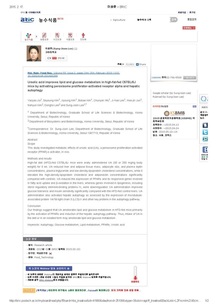
A published research paper from the laboratory of Professor Sung-Joon Lee (Graduate School Department of Biotechnology/Bk21 PLUS Biotechnology) was introduced in BRIC Food Science Accomplishment Focus (first author- YaoYao Jia PhD).
The paper suggests how ursolic acid (medical herb compounds) regulates a nucelar receptor involved in metabolic regulation such as PPAR-alpha. Further more, ursolic acid was found to activate autophagy, thus having an effect in reducing lipid accumulation in blood vessels and liver tissues; And also it regulates blood glucose level therefore attenuating the symptoms of metabolic syndroms.
Paper was published in Molecular Nutrition & Food Research (Issued in February), which is one of the most top rated journals in the field of food science. Our research paper was rated as top 3.25% journal in the JCR field of food biotechnology. In order to be introduced in BRIC, the paper should be within top 5% of corresponding research topic.
The paper suggests how ursolic acid (medical herb compounds) regulates a nucelar receptor involved in metabolic regulation such as PPAR-alpha. Further more, ursolic acid was found to activate autophagy, thus having an effect in reducing lipid accumulation in blood vessels and liver tissues; And also it regulates blood glucose level therefore attenuating the symptoms of metabolic syndroms.
Paper was published in Molecular Nutrition & Food Research (Issued in February), which is one of the most top rated journals in the field of food science. Our research paper was rated as top 3.25% journal in the JCR field of food biotechnology. In order to be introduced in BRIC, the paper should be within top 5% of corresponding research topic.
Laboratory of Professor Sung-Joon Lee discovered an aromatic compound originated from green and black tea, which is associated in metabolic regulation
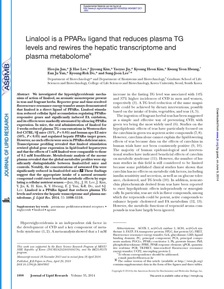
The laboratory of Professor Sung-Joon Lee (Graduate School Department of Biotechnology/Bk21 PLUS Biotechnology
discovered that linalool terpene aromatic compound is associated with metabolic regulation.
Universally, tea (Camelia sinensis) is a second most highly consumed drink, and includes many types such as green tea, black tea, oolong tea depending on how its made. Tea contains a compound called theanine which diminishes arousal effect induced by caffeine, and shows better beneficial health effects than coffee.
The main component of tea was widely known as EGCG, a polyphenol catechin compound. However, consuming concentrated EGCG alone did not show much health benefits compared to drinking tea.
According to professor Lee's reasearch, linalool acts as a ligand for PPAR-α (nuclear receptor protein that mediates lipid metabolism), thus activation of PPAR-α promotes fatty acid oxiation. This results in lowered blood triglyceride levels, decreasing fat accumulation in liver as well.
Especially, in PPAR-α gene knock-out mice, there was no effect of linalool in reducing triglyceride levels, thus revealing that linalool's target protein is indeed PPAR-α.
Furthermore according to genome analysis results, when linalool(1mM) was treated to mice model with high liver fat accumulation, the gene expression pattern of mice model began to show more similar pattern of healthy cell line. And such effect of linalool is strong as Fenofibrate (0.1mM), which is a drug well known for inhibiting triglyceride. In addition, with the help of Professor Kyung-Hun Kim's laboratory from Korea University Food Biotechnology Department, we analyzed the metabolomics of mice that consumed linalool. Our results showed that mice that consumed linalool showed decrease in serum fatty acid levels.
It was already well-known that foods that stimulate our five senses have many health benefits. However unfortunately, many biological effects of aromatic compounds still remains a question. In fact, our research findings provide meaningful contribution in aromatic compound reasearch as well as reasearch on tea health effects.
This research paper was published in Journal of Lipid Research (IF=4.730). Being invited to be part of the review paper, our research findings will be also published in Current Opinion in Lipidology (IF=5.803) Journal, issued in February 2015.
discovered that linalool terpene aromatic compound is associated with metabolic regulation.
Universally, tea (Camelia sinensis) is a second most highly consumed drink, and includes many types such as green tea, black tea, oolong tea depending on how its made. Tea contains a compound called theanine which diminishes arousal effect induced by caffeine, and shows better beneficial health effects than coffee.
The main component of tea was widely known as EGCG, a polyphenol catechin compound. However, consuming concentrated EGCG alone did not show much health benefits compared to drinking tea.
According to professor Lee's reasearch, linalool acts as a ligand for PPAR-α (nuclear receptor protein that mediates lipid metabolism), thus activation of PPAR-α promotes fatty acid oxiation. This results in lowered blood triglyceride levels, decreasing fat accumulation in liver as well.
Especially, in PPAR-α gene knock-out mice, there was no effect of linalool in reducing triglyceride levels, thus revealing that linalool's target protein is indeed PPAR-α.
Furthermore according to genome analysis results, when linalool(1mM) was treated to mice model with high liver fat accumulation, the gene expression pattern of mice model began to show more similar pattern of healthy cell line. And such effect of linalool is strong as Fenofibrate (0.1mM), which is a drug well known for inhibiting triglyceride. In addition, with the help of Professor Kyung-Hun Kim's laboratory from Korea University Food Biotechnology Department, we analyzed the metabolomics of mice that consumed linalool. Our results showed that mice that consumed linalool showed decrease in serum fatty acid levels.
It was already well-known that foods that stimulate our five senses have many health benefits. However unfortunately, many biological effects of aromatic compounds still remains a question. In fact, our research findings provide meaningful contribution in aromatic compound reasearch as well as reasearch on tea health effects.
This research paper was published in Journal of Lipid Research (IF=4.730). Being invited to be part of the review paper, our research findings will be also published in Current Opinion in Lipidology (IF=5.803) Journal, issued in February 2015.
Alumni Employment Status
A graduate student alumni So-Young Lee, and Yu-Ri Han are employed in Amore Pacific and Binggrae Co. respectively.
A graduate student alumni So-Young Lee, and Yu-Ri Han are employed in Amore Pacific and Binggrae Co. respectively.
Ji-Hye Lee , PhD student receives a presentation award from KoSFoST
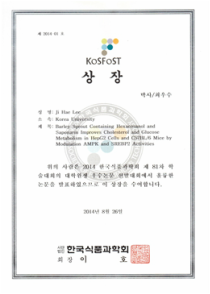
Ji-Hye Lee, PhD student from the laboratory of Professor Sung-Joon Lee received an award for presenting a paper at 81st Korean Society of Food Science and Technology (KoSFoST) conference (2014.8.25-27). Ji-Hye Lee presented a paper titled “Barley sprout containing hexacosanol and saponarin improves cholesterol and glucose metabolism in HepG2 cells and C57BL/6 mice by modulation of AMPK and SREBP2 activities”.
This particular research findings show biological effects and mechanisms of hexacosanol(polycosanol) and saponarin (flavonoid). It was discovered that hexacosanol and saponarin activate AMPK, which is a key protein involved in cell metabolic regulation, while inhibiting SREBP2 which is known as a transcription factor that regulates cholesterol metabolism. Thus, effects of hexacosanol and saponarin are shown to decrease cholesterol and blood glucose levels.
Through this research, we expect to contribute in future development of natural substances using barley sprouts and other crop related materials.
Yao-Yao Jia, PhD receives an award for paper presentation

Yao-Yao Jia, a PhD from the laboratory of Professor Sung-Joon Lee received an award for presenting a paper at Korean
society of Food Science and Technology (KoSFoST) conference (2013.11.14). Yao-Yao Jia presented a paper titled “Cyanidin and its glycoside are agonistic ligands for peroxisome proliferator-activated receptor-alpha and ameliorate hepatic lipid accumulation in HepG2 cells and C57BL/6J mice”.
This particular research findings show biological effects and mechanisms of cyanidin (highly contained in berries). Cyanidin was found to directly bind to nuclear receptor-transcription factor complex, thus regulating gene expressions related to lipid metabolism. This reasearch findings will serve as a background for future studies regarding biological health effects of natural substances, as well as its target molecules in our body.
society of Food Science and Technology (KoSFoST) conference (2013.11.14). Yao-Yao Jia presented a paper titled “Cyanidin and its glycoside are agonistic ligands for peroxisome proliferator-activated receptor-alpha and ameliorate hepatic lipid accumulation in HepG2 cells and C57BL/6J mice”.
This particular research findings show biological effects and mechanisms of cyanidin (highly contained in berries). Cyanidin was found to directly bind to nuclear receptor-transcription factor complex, thus regulating gene expressions related to lipid metabolism. This reasearch findings will serve as a background for future studies regarding biological health effects of natural substances, as well as its target molecules in our body.
FBS is on the news.
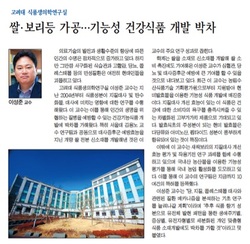
Research activity of the FBS was introduced on the Herald Economics on July 30. Read the article below.
http://news.heraldcorp.com/view1.php?ud=20130723000833&md=20130730115403_AT
http://news.heraldcorp.com/view1.php?ud=20130723000833&md=20130730115403_AT
Color foods include a molecular ligand for PPAR-alpha, cyanidin.
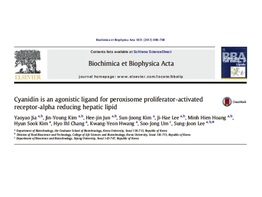
Yaoyao Jia, a PhD student in FBM, published a paper in the April issue of BBA - Molecular and Cellular Biology of Lipids (2013.4). The paper describes the biological effects of cyanidin, an anthocyanin abundant in fruits and vegetables, are achieve by the activation of nuclear receptor PPAR-alpha thus could reduce hepatic lipid accumulation. For details, please read the paper in publication section.
Title: Cyanidin is an agonistic ligand for peroxisome proliferator-activated receptor-alpha reducing hepatic lipid.
Title: Cyanidin is an agonistic ligand for peroxisome proliferator-activated receptor-alpha reducing hepatic lipid.
Doctor Hoang!
In February 2013, Min Hien Hoang was awarded her PhD by the Korea University after 4.5 years of hard work. In FBM, she initiated a luciferase assay-based activity screening with approximately 900 Korean natural extracts and phytochemicals and investigated their metabolic roles by regulating nuclear receptor, mainly LXR. She has been involved in multiple projects in FBM and has published 20 papers in SCI-journals of which 6 were first authored. She now work as a group leader in Algal Biotechnology Department, Institute of Biotechnology, Vietnamese Academy of Science and Technology, Hanoi, Vietnam.
Master graduates got hired.
Master graduates, Byung Gyu Noh, Hae won Kim, Yeo Jin Kim, Jung-Gyu Lee, and Bora Nam got hired in Samsung Electronics, Lotte R&D, CJ R&D, Orient Bio Co. Ltd., and Korea Yakult R&D, respectively. Congratulations on getting a job!

